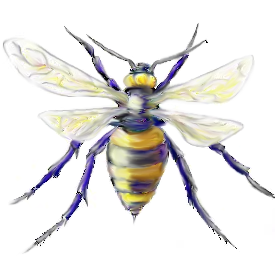Mauve nectarbee
From Wikimalia
(Difference between revisions)
(added descript) |
|||
| Line 3: | Line 3: | ||
|name=Mauve Nectarbee | |name=Mauve Nectarbee | ||
|habitat=Temperate deciduous regions. | |habitat=Temperate deciduous regions. | ||
| - | |description=Horizontally striped in amber and deep violet bands, this hymenoptera sports an unlikely dual-wing set which produces a characteristic low-pitched reedy buzz during flight. Six spindly legs depend from an oversized body, all of which are coated with tiny filament hairs for the collection of pollen. | + | |description=Horizontally striped in amber and deep violet bands, this hymenoptera sports an unlikely dual-wing set which produces a characteristic low-pitched reedy buzz during flight. Six spindly legs depend from an oversized body, all of which are coated with tiny filament hairs for the collection of pollen. Approximately one thum in length for adults, its wingspan is oddly shorter than its length, defying logic as to how this insect flies at all. |
|collection= | |collection= | ||
|notes=Preferring only Dryadslipper Flowers, its honey is stained mauve, and ferments quickly, producing a highly desired fruity liquor. Often, the nectarbee is seen while [[nectarbee|coated in pollens]], giving a distorted impression of its true appearance. It has but a single specialized natural enemy, the dryadslipper spider, although any number of nectar-seeking scavengers might find themselves on the short end of this insect's colonial temper. | |notes=Preferring only Dryadslipper Flowers, its honey is stained mauve, and ferments quickly, producing a highly desired fruity liquor. Often, the nectarbee is seen while [[nectarbee|coated in pollens]], giving a distorted impression of its true appearance. It has but a single specialized natural enemy, the dryadslipper spider, although any number of nectar-seeking scavengers might find themselves on the short end of this insect's colonial temper. | ||
| - | Hives are typically a honeycombed inverted cone, best suited for the highest crotch of a tree to support its weight, although domesticated varieties are often hived in conical baskets | + | Hives are typically a honeycombed inverted cone, best suited for the highest crotch of a tree to support its weight, although domesticated varieties are often hived in conical baskets. |
}} | }} | ||
{{stub}} | {{stub}} | ||
Back to the [[Insect/Arachnid]] page. | Back to the [[Insect/Arachnid]] page. | ||
Revision as of 16:18, 26 November 2008
| The Bug Collection | ||||||||
|---|---|---|---|---|---|---|---|---|
|
| ||||||||
| ||||||||
This article is a stub. You can help Wikimalia by expanding it.
Back to the Insect/Arachnid page.

